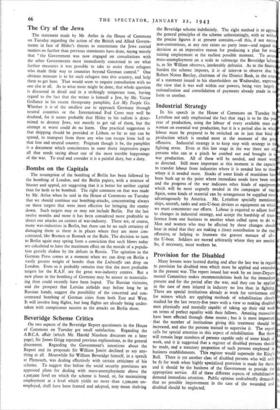Industrial Strategy
In his speech in the House of Commons on Tuesday Mr Lyttelton not only emphasised the fact that 1943 is to be the pe year of production, using the labour of every available man an woman on essential war production, but it is a period also in whic labour must be prepared to be switched on to just that kind production which is needed most at the moment of the grea offensive. Industrial strategy is to keep step with strategy in th fighting areas. Even at this late stage in the war there are s persons who can at a pinch be combed out and brought in t war production. All of these will be needed, and must wor as directed. Still more important at this moment is the capacit to transfer labour from industries where it is needed less to the where it is needed more. Stocks of some kinds of munitions hat been built up to the point where immediate needs have been me and the progress of the war indicates other kinds of equipmen which will be most urgently needed in the campaigns of 1943. e Again, -some kinds of material can by arrangement be supplied more advantageously by America. Mr. Lyttelton specially mentioned ships, aircraft, tanks and anti-U-boat devices as equipment on which we must concentrate our efforts. Labour is required to adjust itself to changes in industrial strategy, and accept the hardship of trans- ference from one business to another when called upon to do so. Men and women who may be affected by these changes should bear in mind that they are making a direct contribution to the 1943 offensive, or helping to frustrate the gravest menace of all— the U-boat. Soldiers are moved arbitrarily where they are needed. So, if necessary, must workers be.


























 Previous page
Previous page